8.
Vittoria, as if she had perceived that sense of estrangement, at times seemed to want to help me get over it, at others accentuated it purposely. Madonna, she’d exclaim, look, we have the same hands, and she’d put hers next to mine, and her thumb would bump against my thumb. That bump filled me with emotion, I would have liked to hug her tight, or stretch out next to her with my head on her shoulder, hear her breath, her rough voice. But, more often, as soon as I said something that seemed wrong to her, she chided me, saying, like father like daughter; or she made fun of the way my mother dressed me. You’re grown up, feel those tits you have, you can’t go out dressed like a little doll, you should rebel, Giannì, they’re ruining you. Then she started up her refrain: look at them, your parents, look at them carefully, don’t let them fool you.
This was very important to her, and every time we met she insisted that I report to her how I’d spent my days. But since I stuck to generic information, she soon got annoyed, teased me cruelly, or laughed noisily, throwing open her big mouth. She was exasperated that all I told her was how much my father studied, how respected he was, that an article of his had been published in a famous journal, and that my mother adored him because he was so handsome and intelligent, that they were both so smart, and that my mother proofread and often rewrote love stories written just for women, she knew everything, she was really nice. You love them, Vittoria said angrily, bitterly, because they’re your parents, but if you can’t understand that they’re shitty people you’ll become shit like them and I won’t want to see you anymore.
To please her, I once told her that my father had many voices and that he modulated them according to circumstances. He had the voice of affection, the imperious voice, the cold voice, all of which spoke a beautiful Italian, but he also had the voice of contempt, which spoke Italian but sometimes dialect as well, and he used it with anyone who irritated him, especially dishonest shopkeepers, drivers who didn’t know how to drive, people who were rude. As for my mother, I said that she was somewhat dominated by a friend named Costanza, and at times was annoyed by Costanza’s husband, Mariano, a friend who was like a brother to my father but joked in a cruel way. Vittoria didn’t appreciate even those more specific confidences, though; on the contrary, she said they were gossip without substance. I discovered that she remembered Mariano, she called him an imbecile, anything but a friend who was like a brother. That phrase made her angry. Andrea, she said in a very harsh tone, doesn’t know the meaning of “brother.” I remember that we were in her house, in the kitchen, and outside, on the dreary street, it was raining. I must have had a forlorn expression, my eyes teared, and this, to my surprise, to my pleasure, softened her in a way that nothing had before. She smiled at me, she pulled me to her, sat me on her lap and kissed me hard on one cheek, nibbling at it. Then she whispered in dialect: sorry, I’m not angry with you but with your father; then she stuck a hand under my skirt and patted me lightly, again and again, with the palm of her hand, between my thigh and my bottom. She said in my ear, yet again: look at them carefully, your parents, otherwise you’re lost.
9.
The frequency of those sudden explosions of affection bursting out of a tonality that was almost always displeased increased and made her increasingly necessary to me. The dead time between our encounters passed unbearably slowly, and in the interval in which I didn’t see her or couldn’t telephone her I felt the need to talk about her. So I ended up by confiding even more in Angela and Ida, after demanding oaths of extreme secrecy. They were the only ones with whom I could boast of my relationship with my aunt, but at first they scarcely listened to me, they immediately wanted to tell me cute stories and anecdotes about their eccentric relatives. But they soon had to give in, there was no comparison between those relatives and Vittoria, who—as I told it—was completely outside their experience. Their aunts and cousins and grandmothers were wealthy ladies of the Vomero, Posillipo, Via Manzoni, Via Tasso. Whereas I placed my father’s sister imaginatively in a neighborhood of cemeteries, wastelands, fierce dogs, gas flares, skeletons of abandoned buildings, and I said: she had an unhappy and unique love, he died of grief, but she’ll love him forever.
Once I confided to them in a very low voice: when Aunt Vittoria talks about how they loved each other, she uses “fuck,” she told me how much and how she and Enzo fucked. Angela was struck above all by that last point, she questioned me at length, and maybe I exaggerated my answers, I had Vittoria say things I’d fantasized myself for a long time. But I didn’t feel guilty, the substance was true, my aunt had talked to me like that. You don’t know—I said, becoming emotional—what a great friendship she and I have: we’re really close, she hugs me, kisses me, she’s always telling me we’re alike. I said nothing, naturally, about the fights she had had with my father, the arguments about the inheritance of a miserable apartment, about the betrayal that had come out of it—that all seemed too degrading. Instead, I told them about how after Enzo’s death, Margherita and Vittoria had lived in a spirit of admirable cooperation and had taken care of the children as if they had taken turns giving birth to them, first one, then the other. That image, I have to say, came to me by chance, but I expressed it even better in the later stories, to the point where I believed myself that both of them had made Tonino, Giuliana, and Corrado. Especially with Ida, almost without realizing it, I came close to giving the two women the capacity to fly through night skies or invent magic potions as they gathered enchanted herbs in the Capodimonte woods. Certainly, I told her that Vittoria talked to Enzo at the cemetery, and he gave her advice.
“Do they talk the way you and I are talking?” Ida asked.
“Yes.”
“So he’s the one who wanted your aunt to be a second mamma to his children.”
“For sure. He was a policeman, he could do what he wanted, he even had a pistol.”
“It’s like my mamma and your mamma were mammas of all three of us?”
“Yes.”
Ida was distressed, but Angela was excited. The more I told and retold these stories, elaborating them, the more they exclaimed: how wonderful, they make me cry. Their interest increased in a particular way when I began to talk about how entertaining Corrado was, how beautiful Giuliana, the fascination of Tonino. I myself was amazed at the warmth with which I described Tonino. That I liked him was a discovery for me, too: at the time, he hadn’t made a great impression, in fact he had seemed to me the least substantial of the three. But I talked so much about him, I invented so well, that when Ida, the expert in novels, said to me: you’re in love, I admitted—mainly to see how Angela would react—that it was true, I loved him.
So a situation was created in which my friends continuously asked me for new details about Vittoria, Tonino, Corrado, Giuliana, and their mother, and I didn’t have to be asked twice to provide them. Up to a certain point, everything went well. Then they started asking if they could meet at least Aunt Vittoria and Tonino. I immediately said no, it was something of mine, my invention, that as long as it lasted made me feel good: I had gone too far, the reality would be poor in comparison. And then I intuited that my parents’ approval was fake, already I was making a huge effort to keep things in balance. A wrong move would be enough—Mamma, Papa, can I take Angela and Ida to see Aunt Vittoria?—and in a flash bad feelings would ignite. But Angela and Ida were curious, they insisted. I was disoriented during that autumn, squeezed between the pressures of my friends and Vittoria’s. The former wanted to verify that the world I was entering really was more exciting than the one we lived in; the second seemed close to pushing me away from that world, from her, unless I admitted that I was on her side and not my father and mother’s. So I now felt colorless to my parents, colorless to Vittoria, not showing a truthful face to my friends. It was in that atmosphere that, almost without realizing it, I began seriously to spy on my parents.
Читать дальше
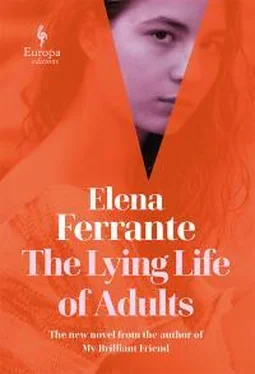
![Элена Ферранте - История о пропавшем ребенке [litres]](/books/32091/elena-ferrante-istoriya-o-propavshem-rebenke-litres-thumb.webp)
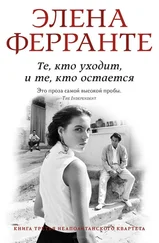
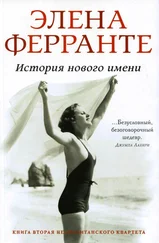
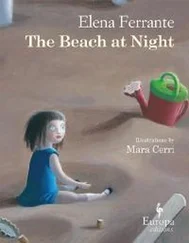
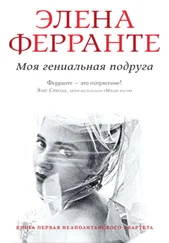
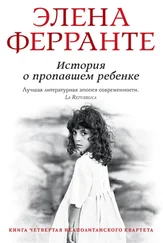

![Элена Ферранте - Дни одиночества [litres]](/books/404671/elena-ferrante-dni-odinochestva-litres-thumb.webp)



